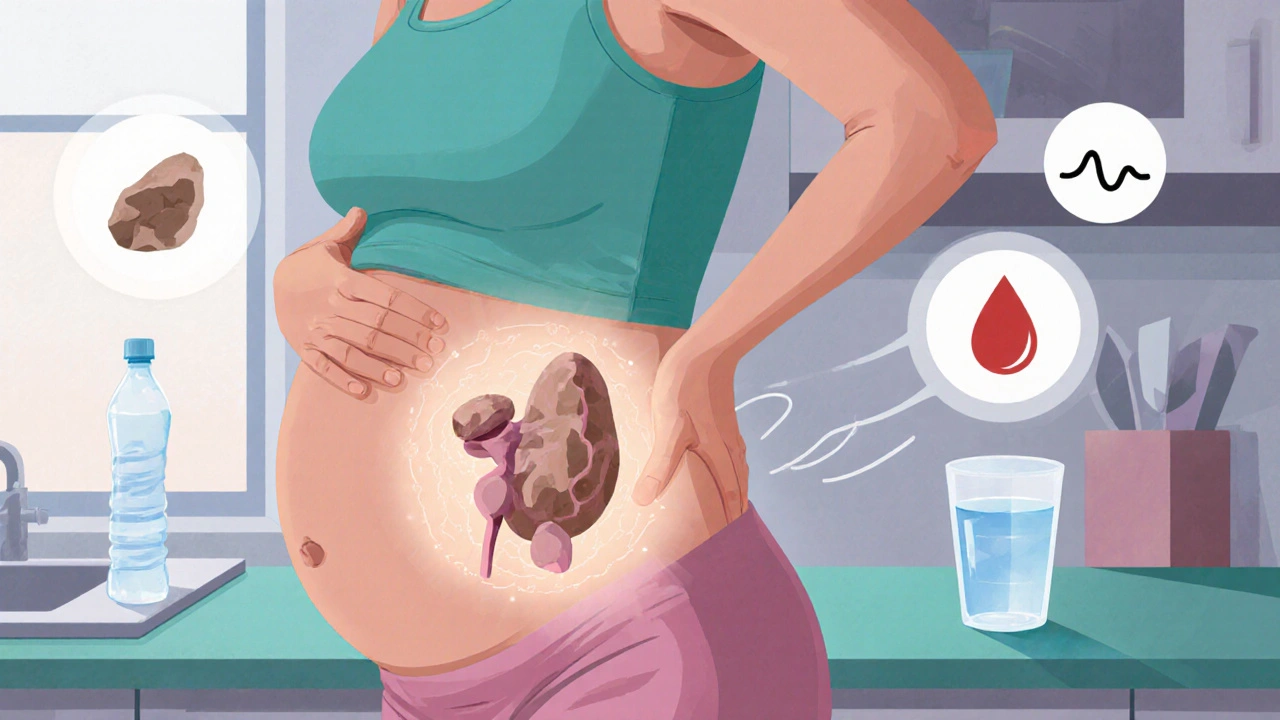Pregnancy Kidney Stones: What You Need to Know
When dealing with pregnancy kidney stones, the formation of mineral deposits in the urinary tract while expecting a baby. Also known as renal calculi in pregnancy, they combine the challenges of kidney stones, hard crystal masses that can block urine flow with the physiological changes of pregnancy, a period of hormonal shifts, increased kidney filtration, and uterine pressure. The condition demands careful pain management, methods that protect both mother and fetus and strategic hydration, adequate fluid intake to dilute urine and flush crystals. Understanding how these entities interact helps you avoid complications and seek the right care. Pregnancy kidney stones affect about 1 in 2,000 pregnant women, making awareness crucial.
Symptoms, Diagnosis, and Treatment Options
Typical signs include sharp flank pain that may radiate to the groin, sudden nausea, and blood‑tinged urine. Because pregnancy already brings backaches and hormonal aches, many sufferers mistake the pain for normal pregnancy discomfort. A doctor will usually order an abdominal ultrasound—safe for both mother and baby—to locate the stone and assess its size. In rare cases, low‑dose CT scanning is considered when ultrasound is inconclusive. Once the stone is confirmed, treatment focuses on three pillars: pain relief, stone passage, and infection prevention. Non‑opioid analgesics such as acetaminophen are first‑line; stronger medications are used only under strict obstetric supervision. If the stone is larger than 5 mm, doctors may recommend extracorporeal shock wave lithotripsy (ESWL) or, in extreme cases, a ureteral stent, both of which have been shown to be safe in the second trimester. Throughout treatment, close monitoring of kidney function and fetal well‑being is essential.
Prevention starts long before a stone appears. Drinking at least 2–3 liters of water daily keeps urine dilute and hinders crystal aggregation. Foods rich in calcium (like low‑fat dairy) bind oxalate in the gut and lower stone‑forming risk, while excessive caffeine, salty snacks, and high‑oxalate foods (spinach, beetroot, nuts) should be limited. Some clinicians suggest a modest dose of potassium citrate to correct urinary acidity, but only after a thorough urine analysis. Regular prenatal visits give an opportunity to screen for urinary tract infections, which can aggravate stone formation. By combining smart hydration, dietary tweaks, and safe medical oversight, most women can navigate pregnancy kidney stones without jeopardizing their pregnancy.
Now that you’ve got the basics of causes, symptoms, and safe management, explore the articles below for deeper dives into specific medications, diagnostic tools, and lifestyle tricks that can help you stay comfortable and healthy throughout your pregnancy.
Kidney Stones and Pregnancy: Essential Facts & Safe Management Tips
Learn how to recognize, diagnose, and safely treat kidney stones during pregnancy with hydration tips, safe imaging options, and expert-led management advice.
View more
